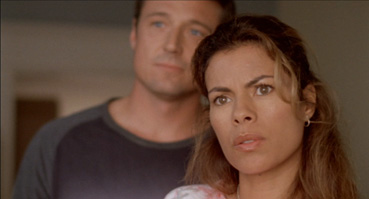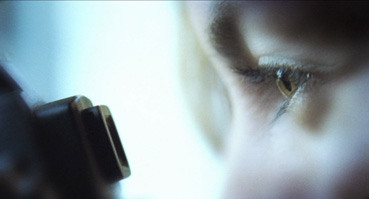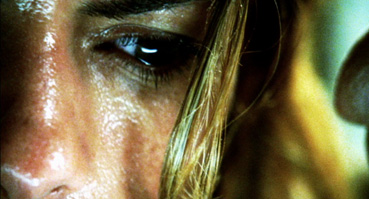|
Here's a question for all the men out there, at least those who actually have some respect for their partner. If your significant other suddenly becomes frightened and tells you that she saw someone watching her from outside the house, but when you look there's no sign of anyone, what would you do? Personally I'd go outside and do a thorough check for the bugger and keep my eyes peeled for further appearances. But in horror movies the husband or boyfriend, on seeing no-one there, will immediately assume that his partner has been under a bit too much strain lately and has started seeing things. If she sees the figure again, then as far as hubby's concerned she's starting to lose her marbles. What an unsupportive tosser. This is just one of a number of genre clichés and borrowed elements that are trotted out during the course of Dark Mirror, the decently made, inoffensive but largely undistinguished 2007 feature debut from writer-director Pablo Proenza.
It starts well enough with 30-something Deborah waking up in her bed in a bit of a daze and discovering that she has a kitchen knife stuck in her ribs. We then hop back three months and find our Deborah on a hunt for a new house with husband Jim and young son Ian. The latest on their viewing list was previously owned by a famous painter and is still being redecorated, but Deborah instantly falls for it. Quite why is unclear, something about the way the light falls through the windows. The special windows. More on them in a minute. In the blink of an edit they're moving in and playing that chase-and-tickle game that's so popular with filmmakers looking quickly show us how well a family gets on. It's then that our Deborah catches her first glimpse of the mysterious lurker. Hubby, of course, laughs off her concerns.

That evening, Deborah, an aspiring photographer, is working late on her photos when she decides to take her own picture in the bathroom mirror. It may sound like an unlikely thing to do, but there's another mirror behind her head that creates that infinite loop effect you see when you stand between two facing reflective surfaces. It's actually an interesting image. But when the flash fires, instead of ruining the photo like it normally would (which, as a budding photographer, she really should have foreseen), the light shoots through the mirror down an invisible tunnel and she ends up with a picture of a second bathroom a few doors down. Which is actually rather neat.
The next day, Deborah has an interview for a photographic job with two ad agency chaps who do their best to sell themselves as a modern gay couple, but behind her back talk a little too loudly about about how much they'd like to do her. In that way DSLRs have of just firing for no reason, the camera accidentally goes off in the face of one of these twerps. Later that day he's on his way to his car when he is distracted by a couple of bright camera-style flashes. When he investigates, he is attacked and killed by the very same lurker that's bothering our Deborah, and a few days later the news comes through that our boy has disappeared. Following another abortive interview, Deborah is given a start when an angry woman starts banging on her car window, loudly complaining about damage done to her vehicle. Boy does she go on. Longer, I'd say, then any real life complainer would do without trying to open the car door or otherwise varying her behaviour. The seriously rattled Deborah decides to take her picture (well you would, wouldn't you). Later that day she's also listed as missing. So what's going on here?
Clues are provided by Debbie's matronly mother, who appears out of the blue to assist her daughter in delivering the odd bit of fanciful background exposition. It's during her first visit that we learn that the house windows are made from a special glass imported from China, one that traps evil spirits and protects the building's occupants. It's also the mother who reveals that the painter who previously lived in this house was thought by some to have become possessed. Aha...

As you may have already have picked up from this incomplete plot summary, not everything that happens is clearly explained or follows the film's own shaky internal logic. A reason of sorts is provided towards the end, a not-so-new twist that can't help but feel more like a get-out clause than a satisfying explanation. It also allows Proenza and his co-writer Matthew Reynolds to throw a number of horror sub-genres into the melting pot and borrow and adapt elements from a string of recognisable sources. There's the figure that stands watching in a hooded raincoat like a tall refugee from Don't Look Now, Communion or Dark Water (one who turns invisible in one scene purely to show off a footprints-on-wet-carpet special effect). There's the boy who suddenly finds himself locked in a bathroom whose door easily opens when his panic hits a peak. There's the camera that predicts and perhaps causes the death of those it photographs and can even be used as a weapon, a blend of signature elements from The Omen and the anime series Speed Grapher. Deborah's gradual transformation, meanwhile, has strong echoes of the the one undergone by caretaker Jack Torrance in The Shining, and her horrified discovery that her husband and son have been caught on the killer camera is a straight lift from a key twist in Ringu. Even the intriguing concept of haunted mirrors was explored in considerably more depth in 2003 by the Korean genre work Into the Mirror [Geoul sokeuro], which was remade in the US as Mirrors in 2008. That said, I really liked the two doors in the mirror idea (you'll need to see the film to get what I'm on about), particularly when I found out how simply the effect was achieved.
Technically at least, Dark Mirror is a solid enough debut feature, albeit one that fluffs a few golden opportunities to rack up the tension (so much more could have been made of Deborah's investigation of the chimney in which she discovers a hidden painting, for example), and its characters lack the depth they need to register as anything more than horror movie staples. Lisa Vidal does rather well as Deborah, despite spending a good part the film wearing an expression of startled concern. She certainly makes more of an impression than the supporting cast, who range from dull (as Deborah's son Ian, Joshua Pelegrin barely registers) to annoying (Christine Lakin as Deborah's bimboid neighbour Tammy) to straight-up miscast (Jay Knowlton looks more like a first-time supply teacher than a detective). As a potpourri of modern horror motifs it may work rather well for those looking for an introduction to the genre as it currently stands. But those well versed in the films it freely if possibly unconsciously adapts and borrows from may well find themselves pestered by a nagging sense of déjà-vu, and struggling to care for the fate of its somewhat underdeveloped protagonists.
If you're looking for an example of how something shot on film can be made look digital in origin then your long search is over. I was convinced from the start that Dark Mirror was shot on HD, but that's definitely a film camera in the behind-the-scenes featurette, yet the some post-production tweaking and a sometimes flat transfer have done the image no favours. The contrast depends on the effect being applied, being cranked up in some, a little dull in others, and in one scene (when Deborah returns to her car after her meeting with the advertising twerps) the image is so bleached that the car is rendered as a vehicle-shaped blob of almost detail-free pure white. The colours and grain also vary quite a bit, and while the detail is reasonable for the most part, there are one or two shots that are soft enough to suggest that something went wrong at the shooting stage.

The Dolby 5.1 surround track is a front-weighted affair with some subtle activity at the rear, a solid enough mix with a good dynamic range and a nice bass response when required. The Dolby 2.0 stereo track, by comparison, is a rather tinny and lifeless affair that is nowhere near as effective, lacking the required wallop on audio-assisted scares and at times sounding a little like it would if played through the built-in speaker on an iPad. Go with the 5.1.
Director's Commentary
Actually a director/producer/actor commentary, as co-writer and director Pablo Proenza is joined here by lead player Lisa Vidal and producer Erin Ploss-Campoamor. Now when I say joined, I used that term loosely, as the commentary is dominated from the outset by Ploss-Campoamor, whose hyperactive delivery and giggling makes it sound like she swallowed a fistful of amphetamines before sitting down for the session. This does make the whole commentary hard work for those with sensitive dispositions to sit through, despite the odd interesting bit of behind-the-scenes info provided by Proenza, when he can get a word in edgeways. Unsurprisingly, perhaps, the initial overuse of the word 'awesome' is eventually overtaken by all three telling us how much they 'love' this, that or the other, a too-common fault of modern American commentary tracks.
Behind the Scenes (8:40)
A standard collection of disjointed behind-the-scenes footage peppered with the odd lightweight interview with crew members and some info on the production from producer Erin Ploss-Campoamor.
Trailer (1:23)
A bang-bang-bang-terror! trailer that makes the film seem louder than it is or needs to be.
There's nothing really wrong with Dark Mirror – there are few modern horror films that don't borrow from their peers and predecessors, whether they mean to or not – and it certainly gains points for its low-key approach. But it's also a hard film to get that excited about, a patchwork of supernatural horror motifs with characters to match, despite some solid work by lead player Vidal. The transfer on Arrow's DVD is a little flat, but the 5.1 surround track delivers the goods. I was not a big fan of the extras, but they'll doubtless work for some.
|